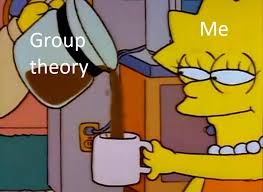Modern Algebra 1

Group
Lagrange Theorem
If $H$ is a subgrop of a group $G$, then $\lvert H \rvert \mid \lvert G \rvert$, in other words, $\lvert G \rvert = [G:H] \lvert H \rvert$.
- Cyclic Group
- Symmetric Group
- Coset
- Lagrange Theorem 🔥🔥
- Permutation Group
- orbit; cycle; transposition
- Alternating Group
Fundamental Theorem of Finitely Generated Abelian Group
F.T of f.g. Abelian Group
Every f.g. abelian group $G$ is isomorphic to direct product of cyclic groups.
\[G \cong \mathbb{Z}_{(p_1)^{r_1}} \times \mathbb{Z}_{(p_2)^{r_2}} \times \cdots \times \mathbb{Z}_{(p_n)^{r_n}} \times \mathbb{Z} \times \mathbb{Z} \times \cdots \times \mathbb{Z}\]Where $p_i$ are primes, not necessarily distinct, and $r_i$ are positive integers.
- Decomposable & Indecomposable group
- $p$-group 1
Factor Group & Homomorphism
condition for operation well-definedness on Factor group
\[H \trianglelefteq G \iff gHg^{-1} \subseteq H \quad (\forall g \in G)\]- Factor Group
- from normal subgroups
- from homomorphism
- Auto-morphism
- inner automorphism $\sigma_g$
Fundamental Homomorphism Theorem
Let $\phi: G \longrightarrow G’$ be a group homomorphism, THEN
- $\phi[G]$ is a group.
- ${G}/{\ker \phi} \cong \phi[G]$
- Fundamental Homomorphism Theorem(FHT); 1st Isomorphism Thm 🔥🔥
- Canonical homomorphism $\gamma: G \longrightarrow G/H \quad (H \trianglelefteq G)$
- index-2 group is normal
- Factor Group - Application
Advanced Group Theory
- Three Isomorphism Theorems 🔥
- Three Sylow Theorems 🔥
- $p$-group
- normalizer of $H$ in $G$; $N_G(H)$
- Sylow $p$-group
- Application 1 🔥
- Application 2 🔥
- Examples 🔥
Ring & Field
- Ring 1, 2
- commutative ring
- Ring homormophism & isomorphism
- Unity; multiplicative identity
- division ring
- Field & Skew Field
- Quaternion
- zero-divisor
- Bezout’s Identity
- Charasteric of Ring; $\textrm{Char}(R)$
- Integral Domain
Fermat’s Little Theorem
Let $p$ be a prime, IF $a \in \mathbb{Z}$, and $p \nmid a$, THEN
\[a^{p-1} \equiv 1 \quad (\textrm{mod} \; p)\]Euler’s Theorem
If $a \in \mathbb{Z}$, and $(a, n) = 1$, THEN
\[a^{\varphi(n)} \equiv 1 \quad (\textrm{mod} \; p)\]NOTE: if $n = p$, then $\varphi(p) = p-1$
- Euler’s Theorem 🔥
- Euler phi function
- Application: solve modulo equation $ax \equiv b$ (mod $n$)
- Quotient Field (= Field of Qutients; 분수체)
- Extend integral domain $D$ into field $F$.
- Extend $\mathbb{Z}$ into $\mathbb{Q}$
- Extend integral domain $D$ into field $F$.
- Ring of Polynomials
- Evaluation Homomorphism; $\phi_\alpha$
- Division Algorithm for Polynomial Ring
- zero of polynomial
- Factor Theorem; 인수 정리
- cyclic group embedding
Eisenstein Criteria
Let $p \in \mathbb{Z}$ be a prime, $f(x) = a_n x^n + \cdots a_0 \in \mathbb{Z}[x]$
IF
\[\begin{aligned} a_n &\not\equiv 0 \quad (\textrm{mod} \; p) \\ a_i &\equiv 0 \quad (\textrm{mod} \; p) \quad 0 \le i < n\\ a_0 &\not\equiv 0 \quad (\textrm{mod} \; p^2) \\ \end{aligned}\]THEN, $f(x)$ is irreducible over $\mathbb{Q}$.
- Irreducible Polynomials
- Eisenstein Criteria 🔥
- Non-commutative Examples
- Group Rings & Group Algebras
- Group Ring; $R(G)$
- Group Algebra; $F(G)$
- The Quaternions; $\mathbb{H}$
- Wedderburn’s Theorem
- “Every finite division ring is a field.”
Factor Ring & Ideal
- Ring Homomorphism & Factor Ring
- Factor Ring well-definedness
- Ideal
- Maximal & Prime Ideals
- Ideal + unity = Ring 🔥
- Maximal Ideal
- Maximal Ideal makes factor group as field.
- Prime Ideal
- Prime Ideal makes factor group as integral domain.
- Maximal Ideal implies Prime Ideal
- Prime Field
- $\textrm{Char}$와 sub-ring / sub-field 사이의 관계
- $\mathbb{Z}_p$, $\mathbb{Q}$ are Prime Field
Prime ideals generalize the concept of primality to more general commutative rings.
- Prime & Irreducible element
- Prime element
- Irreducible element
- Principal Ideal
- Principal Integral Domain; PID
Advanced Ring & Field Theory
- Unique Factorization Domain; UFD 1, 2
- Associate / Associated element 🔥
- In UFD, Irreducible elt is also a Prime elt.
- Every PID is UFD 🔥
- Fundamental Theorem of Arithmetic
- Gauss’s Lemma
- (primitive) $\times$ (primitive) = (primitive)
- Polynomial over UFD
- Euclidean Domain
- Euclidean norm
- Euclidean Algorithm
- Gaussian Integers 🔥
- Multiplicative norm
- Fermat’s Theorem on Sums of Two Squares; 페르마의 두 제곱수 정리
Galois Theory
🔥 Continued on Morden Algebra II … 🔥
Problem Solving
Appendix
For a homormophism $\phi$,
if $\ker \phi = \{ e \}$, then $\phi$ is 1-1.
Ring-Domain-Field
- Field $\implies$ Integral Domain
- Finite Integral Domain $\implies$ Field
- Finite Division Ring $\implies$ Field (Wedderburn’s Theorem)
헷갈리는 조합 1
- Quotient Field
- Factor Ring
헷갈리는 조합 2
- Factor Ring Ring / Ideal
- Factor Theorem
- Unique Factorization Domain(UFD)
Homomorphism 모음
- canonical homoomprhism (= natural homomorphism)
- (Group) $\phi: G \longrightarrow G / N$
- (Ring) $\phi: R \longrightarrow R / I$
- evaluation homomorphism
Maximal Ideal 모음
- $p\mathbb{Z}$ is Maximal Ideal.
- Factor Ring from Maximal Ideal = Field
- $F[x]$ is a Field and $p(x) \in F[x]$
- $\left< p(x) \right>$ is a Maximal Ideal $iff$ $p(x)$ is irreducible in $F[x]$.
Study Materials
- 『A First Course in Abstract Algebra』 Fraleigh, 7th ed.
- 『Abstract Algebra』 Dummit & Foote, 3rd ed.
-
Sylow Theorem 할 때도 잠깐 나온다! ↩
